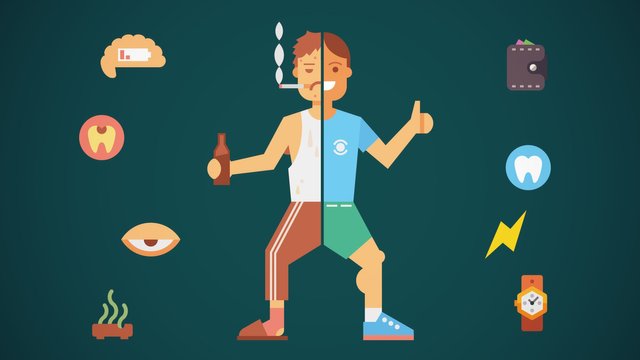Tricks to help you be persistence
Do you still remember what you've been persisting for the longest time? I have been pondering for a long time, only to find that what I persist on the longest is only eat and sleep.
Why we can’t persist in doing other things just like eating and sleeping?
I wonder if you have such a situation? When seeing others slim body, feels envy, so buy sportswear and started exercising. But after a few days, can’t see the effect then give up. Seeing other people make money by writing, started to plan to write 1000 words a day, read 100 pages of books, join a writing training course. But in less than 5 days, notice that it is too difficult, and give up.
At this time, someone will tell you that you can’t insist is because you are not hardworking enough, if you want to succeed, your every effort must move. So you went everywhere to find all kinds of motivation articles.
But those motivation articles are always a palliative, after working hard for a few days, and plunged into the same cycle.

source
Is there a way that we can do something like eating and sleeping as natural as it is easy and effortless?
Yes, there really is such a way. A Japanese man named Furukawa has written a book called "Persistence, a habit that can be cultivated." The book has received a five-star recommendation from the Amazon in Japan and is seen as a welcome measure. Furukawa mentioned the reasons why we give up when we want to lose weight, want to quit smoking, want to cultivate a good habit.
It is not that we do not work hard, nor is our willpower not strong enough, but we do not have the right method.
Then what is the right way? Why can't we become accustomed to what we want to keep doing, and how to develop a good habit? We can say from the following three aspects: first, why do we always easily give up? Second, what is the key to good habits? Third, how to persist in scientific and effective?
Why do we always give up?
We always give up is very much related to our bodily function, and human beings have the characteristics of "the tendency to resist new changes and maintain the status quo". Use your body temperature as an example. Generally speaking, the normal body temperature is about 36~37℃, the body has maintained this temperature, whether it is the heat or winter, our body will not be affected by the environment changes to maintain the normal temperature.
When we have a cold or a fever, our body will cool itself down by sweating.
This example shows that we are more comfortable in a fixed state and feels threat once we step out of the comfort zone. When the new habit changes, the body feels threatened, so many people are easy to give up for the new thing and cannot continue. This phenomenon is also called customary gravity.
It is also the root cause of our easy to give up.

What is the key to good habits?
What is the habit? Habits are an unconscious response to external stimuli or a reflex reaction, and when the body learns some kind of action, it can easily react without thinking or trying. In simple terms, habits are programmed in mind. For example, we wake up every morning, eat breakfast, go to work, go home, eat dinner, sleep.
These fixed and repetitive actions become unconscious repetitive movements that form a person's daily life.
Some habits can easily be cultivated, such as writing diaries; some habits are difficult, such as weight loss. This is because the resistance of customary gravity to different habits is not the same as the degree of behavior, physical degree, and degree of thinking. Behavior habit is the regular daily behavior, eating, reading, writing a diary and so on. It takes about one month to develop this habit.
Physical habits are habits related to the rhythm of the body, weight loss, exercise, getting up early, quitting smoking and so on. It takes about three months to develop. The habit of thinking that is related to thinking ability, such as logical thinking ability, creative ability and so on.
It takes about 6 months to cultivate.
The key to good habits is that we need to know these three stages:
Stage One: The Resistance period (day 1 to day 7), immediately want to give up, 42% of the people will fail. Also known as "The give up stage".
Stage Two: Unstable period ( day 8 to day 21), affected by a predetermined matter or others, 40% of the people have failed at this stage.
Stage Three: Burnout period (day 22 ~ day 30) gradually getting bored, 18% of people failed at this stage.

How to persist in scientific and effective
Now that we know how to develop a good habit to get through 3 stages, how to develop a good habit scientifically and effectively? How to solve the problem in the 3 stages above? In order to prevent failure, we must abide by three principles before cultivating new habits, or you will fail in the beginning.
Principle one: Lock a habit. Don't be greedy, don't cultivate many habits at the same time. If you are dieting and exercising while losing weight, there is a high percentage that you will fail.
Cultivate multiple habits at the same time, will need to bear more customary gravity. Unless your willpower is very strong, otherwise, you will be prone to failure.
Principle two: Stick to simple and effective action. There are too many rules of action, too complex will make you easy to fail.
Although you can 30 rules of action for a habit, if you can’t remember, it is more difficult to execute.
Principle three: Don't care too much about the result. Don't give up because you don't see the expected result for the time being.
Focus on goals to improve motivation, but the most important thing is to pay attention to the habit of training itself.
Next, we can look at the various stages of problems and how to respond.
The first stage: the Resistance period
When we cultivate a habit, we start with full confidence, but after a few days it becomes boring, and we become lazier, what can we do?
Action one: Start with a baby step.
As the name implies, just like the baby start learns to walk, that is, start small. Our give up is a habit of gravitational force in the resistance. Do not change on a large scale at this time, it will be more appropriate to start small.
Action two: Record
The effect of recording is to be able to eliminate casual feelings and grasp the facts objectively.
By recording to examine the effect, the power will gradually improve, the action can continue.
Stage two: Unstable period
This stage is often interrupted due to unexpected events; overtime, personal affairs, and other reasons.
In this case, we need to build resilient mechanisms to cope with difficulties.
Action One: Behavioral patterns.
Take the habit you want to cultivate into a fixed pattern (time, practice, place) and execute it carefully.
Action two: Set an exception rule.
The exception rule is used for the irregular occurrence of events in advance to formulate a response to the rules of the elastic response mechanism, in advance to make the exception rules, can be used flexibly in the unexpected situation, such as the bad mood today, then read only 10 pages of books rather than 50 pages of the rule.
Action three: Set the continuous switch
Continuous switching is a clever way for people to develop habits in order to be able to maintain a sustained action.
In the book "Persist, a habit that can be cultivated". The author mentioned 12 kinds of switches, including candy type and punishment type. Candy types include rewards, compliments, games, ideal patterns, rituals, removal barriers. The penalty type includes: Profit and loss calculation, make friends, announce to the public, punishment, set goals and force action and other switches.
We can choose freely according to our own character.
Stage Three: Burnout period
In the burnout period, we will not feel the significance of cultivating habits, because the static create a sense of emptiness, then need to change to let us hold on.
Action One: Add changes
Someone who has been working for a few years suddenly wants to resign because the state of being in constant condition makes them feel bored.
When this happens, we need to add ideas to the plan, use changes to break the monotony of the atmosphere, and let ourselves start again.
Action two: Plan the next habit
To get rich results, sow the seeds of constant habit and make good habits coherent. Once you've developed a habit, make your next habit plan right away.
Probably the first habit of 80% or so can be drawn up next.


Posted from my blog with SteemPress : http://walkinharmony.vornix.blog/2018/09/20/tricks-to-help-you-be-persistence/
I really enjoy reading your post. I am a doctor and this post may help me to assist my patient on developing a suitable habit for them. Thanks.
Cheers.
Sir ,wow it to be relate unconscious response, to a habituate drunkard to quiet liqueur.